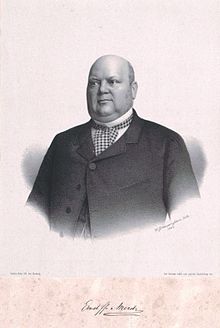Ernst Merck: Difference between revisions
created article |
m Moving Category:Barons of Germany to Category:German barons per Wikipedia:Categories for discussion/Log/2024 June 18#Fooian Barons |
||
| (25 intermediate revisions by 23 users not shown) | |||
| Line 1: | Line 1: | ||
{{Short description|German businessman and politician (1811–1863)}} |
|||
'''[[Freiherr]] Ernst Merck''' (20 November 1811 – 6 July 1863) was a German businessman and politician. |
|||
[[File:Ernst Freiherr von Merck.jpg|thumb|'''Ernst Freiherr von Merck''']] |
|||
Merck, born in [[Hamburg]], was a member of the [[Frankfurt Parliament]] for a year from 1848 to 1849. |
Merck, born in [[Hamburg]], was a member of the [[Frankfurt Parliament]] for a year from 1848 to 1849. |
||
Merck was also the cavalry chief of the [[Hamburg Citizen Militia]]. |
Merck was also the cavalry chief of the [[Hamburg Citizen Militia]], founder of the [[Zoological Garden of Hamburg|Zoological Garden in Hamburg]], and initiator of an association to rescue shipwrecked persons. |
||
In 1853, Merck was appointed Austrian Consul General in Hamburg. He invested at that time in the railway lines of Austria and in 1856 co-founded and joined the board of the [[Empress Elisabeth Railway]], named after the [[Elisabeth, Empress of Austria|Empress of Austria]]. Thanks to his work, he was raised in 1860 by Emperor [[Franz Joseph of Austria|Franz Joseph]] to the rank of baron in the hereditary Austrian nobility. This was not positively received by the citizens of Hamburg, which was a republic. Even his half-brother, Syndicus [[Carl Merck]] (1809-1880) took occasion to complain that recently Hanseatic citizens "hunted for Orders and nobility and the other satisfactions for vanity."<ref>Renate Hauschild-Thiessen: Adel und Bürgertum in Hamburg, 1997, section. XXXI</ref> |
|||
==Notes== |
|||
{{reflist}} |
|||
== References == |
== References == |
||
{{ |
* {{De-ADB|21|398|399|Ernst Merck}} |
||
== External links == |
|||
* {{DNB portal|116891297|TYP=}} |
|||
{{Authority control}} |
|||
{{DEFAULTSORT:Merck, Ernst}} |
{{DEFAULTSORT:Merck, Ernst}} |
||
| Line 12: | Line 23: | ||
[[Category:1863 deaths]] |
[[Category:1863 deaths]] |
||
[[Category:Members of the Frankfurt Parliament]] |
[[Category:Members of the Frankfurt Parliament]] |
||
[[Category: |
[[Category:19th-century German businesspeople]] |
||
[[Category: |
[[Category:Politicians from Hamburg]] |
||
[[Category: |
[[Category:German barons]] |
||
[[Category:Hamburg America Line]] |
|||
[[de:Ernst Merck]] |
|||
Latest revision as of 23:03, 28 June 2024
Freiherr Ernst Merck (20 November 1811 – 6 July 1863) was a German businessman and politician.

Merck, born in Hamburg, was a member of the Frankfurt Parliament for a year from 1848 to 1849.
Merck was also the cavalry chief of the Hamburg Citizen Militia, founder of the Zoological Garden in Hamburg, and initiator of an association to rescue shipwrecked persons.
In 1853, Merck was appointed Austrian Consul General in Hamburg. He invested at that time in the railway lines of Austria and in 1856 co-founded and joined the board of the Empress Elisabeth Railway, named after the Empress of Austria. Thanks to his work, he was raised in 1860 by Emperor Franz Joseph to the rank of baron in the hereditary Austrian nobility. This was not positively received by the citizens of Hamburg, which was a republic. Even his half-brother, Syndicus Carl Merck (1809-1880) took occasion to complain that recently Hanseatic citizens "hunted for Orders and nobility and the other satisfactions for vanity."[1]
Notes
[edit]- ^ Renate Hauschild-Thiessen: Adel und Bürgertum in Hamburg, 1997, section. XXXI
References
[edit]- "Ernst Merck", Allgemeine Deutsche Biographie (in German), vol. 21, Leipzig: Duncker & Humblot, 1885, pp. 398–399
External links
[edit]- Ernst Merck in the German National Library catalogue
